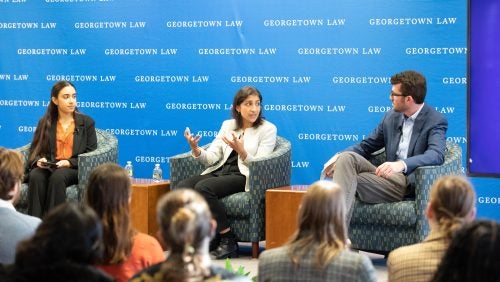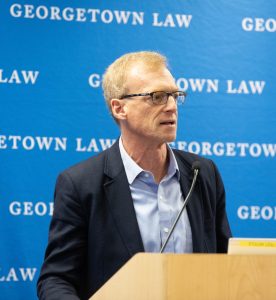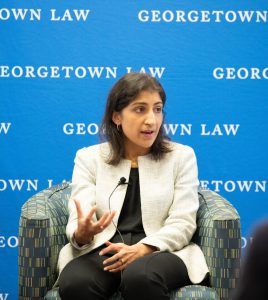FTC Chair Lina Khan Discusses the ‘Promises of Antitrust’ at Georgetown Law
December 4, 2023

FTC Chair Lina Khan was joined by student moderators Mariam Eskander L'24 (left), and Ricky Coyne, L'25 (right).
Call it the antitrust renaissance: Under the leadership of Lina Khan, who was sworn in as the youngest-ever chair of the Federal Trade Commission (FTC) at age 32 in 2021, the agency has gained attention for taking on challenges such as the regulation of Big Tech companies and artificial intelligence.
On Nov. 27, Khan visited Georgetown University Law Center for a lively, student-led question-and-answer session about current issues in antitrust enforcement and consumer protection, including the agency’s recent suit alleging anti-competitive practices by online commerce giant Amazon.
“One of the great promises of antitrust is that we have these age-old statutes that are supposed to keep pace with market developments, new technologies and new business practices,” Khan said of the federal antitrust laws that prohibit monopolies. “In order to be faithful to that [promise], we need to make sure that doctrine is updated.”

Professor Howard Shelanski introduced FTC Chair Lina Khan.
Khan also acknowledged the longstanding link between the Georgetown Law community and the FTC, including the work of Dean Emeritus Robert Pitofsky, who served as FTC chairman from 1995 to 2001 following his deanship. Faculty audience members with ties to the agency included former FTC General Counsel Professor Jonathan Nuechterlein; Professor David Vladeck, LL.M.’77, former director of the FTC’s Bureau of Consumer Protection; and Professor Howard Shelanski, former director of the FTC’s Bureau of Economics.
A dual mandate
Mariam Eskander, L’24, and Ricky Coyne, L’25, both students in Shelanski’s antitrust law class, moderated the discussion.
“It was really interesting to hear how Khan thinks about active issues,” Eskander said of topics such as the 2023 Draft Merger Guidelines released jointly this summer by the FTC and Department of Justice as part of the Biden Administration’s push to reinvigorate merger enforcement.
For Coyne, who will intern at the FTC this spring, Khan’s oversight of the agency has been nothing short of inspiring. “Her appointment [as FTC chair] was one of the reasons why I decided to attend law school in D.C.,” he said, citing her energization of the antitrust field and reorientation of the goals of antitrust enforcement.

Marvin Clark, L’25, asked Khan about the agency’s stance on tech start-ups that pursue acquisition.
Following the moderated discussion, student attendees posed questions on a range of topics. Marvin Clark, L’25, an Opportunity Scholar and Business Law Scholar with an interest in antitrust and securities litigation, asked Khan about the agency’s stance on tech start-ups that actively pursue acquisition by larger companies — a move that can stifle competition.
“[Acquisition] is always going to be a path that some firms in some instances want to pursue,” Khan said. “We recognize that and don’t have a philosophical view on whether that’s good or bad. It’s really about whether the acquisition threatens to lessen competition or create a monopoly.”
Monopolies were also at the heart of a question from Ursa Beckford, L’24, who asked if increased enforcement of the Robinson-Patman Act, the federal law outlawing price discrimination, might help preserve small businesses in light of corporate competition — a question based on his experience watching large chains replace local businesses in his home state of Maine.
“It is currently an area of focus for us,” Khan said of the Act, which she noted has not been “vigorously enforced” for several decades. That said, she cautioned that “rebuilding the muscle” of enforcement can take time, particularly in the case of “dormant areas” of the law.
Khan also emphasized that the agency’s dual mandate — to enforce both federal antitrust and consumer protection laws — is self-reinforcing. “[Dominant] firms can use that dominance to engage in consumer protection violations,” she said, “That [is something] we’re very aware of and are trying to incorporate into how we conduct our investigations.”
Antitrust in the field
Khan also offered advice to students interested in pursuing antitrust careers, namely, the power of maintaining a “sense of curiosity.”

Khan rose to prominence as a law student after the publication of her 2017 Yale Law Journal article “Amazon’s Antitrust Paradox.”
Although she first emerged as a key voice in the national antitrust debate as a third-year law student following the publication of her 2017 Yale Law Journal article “Amazon’s Antitrust Paradox,” which proposed a new framework for understanding anti-competitive behavior, Khan credits on-the-ground experience with exposing her to the realities of antitrust doctrine.
“It was really from talking to people on the ground and understanding the reality of how [business deals like mergers] had affected them that I started to get a greater appreciation for antitrust in the field,” she said of her early experience as a business reporter and journalist.
As for the future of antitrust, Khan emphasized the field’s expansiveness. “It’s just a constant set of interesting and exciting issues,” she said. “Which is, I think, what contributes to it being such an enormously exciting field right now.”